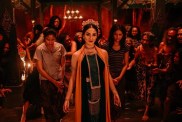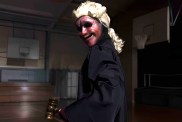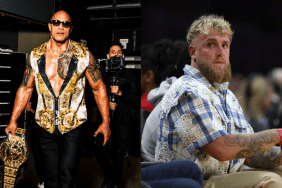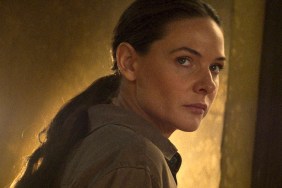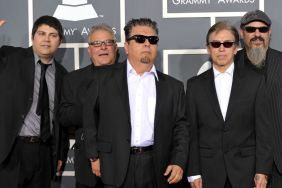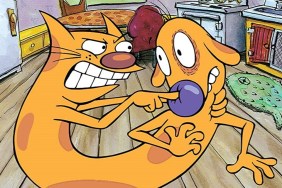Trying to encapsulate someone’s life story into the timespan of 120 minutes or less is unlikely to do that person’s life justice, which is why it’s surprising how often Hollywood biopics try while filmmakers like Steven Soderbergh and Jean-François Richet took the approach with their respective films about Che Guevara and Jacques Mesrine to break their stories into two separate movies.
Like those movies, Olivier Assayas’ Carlos is by no means a conventional biopic, but it’s the French director’s most ambitious work, following the exploits of the terrorist born Ilich Ramirez Sánchez, but better known as Carlos the Jackal, portrayed by Venezuelan actor Édgar Ramírez in the performance of his career.
Over the course of three chapters, each at least 100 minutes long, Assayas’s film follows Carlos from his days as a revolutionary fighting alongside the Palestinians in Jordan before joining the Hassad and masterminding one of his most daring operations, breaking into the 1975 OPEC meeting in Vienna and kidnapping dozens of international oil ministers. Carlos remained free for nineteen years, taking on all sorts of assignments from whomever would hire him, creating terror alongside a cadre of shifting conspirators including his East German wife Magdalena Kopp, a breakthrough performance by Austria’s Nora von Waldstätten. Every one of Carlos’ operations and political dealings is shown in meticulous detail leading up to his arrest in France in 1994. The film premiered to raves at this year’s Cannes Film Festival and is already rightfully being deemed Assayas’ magnum opus.
ComingSoon.net sat down with Assayas and Ramirez when they were in New York to present Carlos at the New York Film Festival. Having spoken with Olivier a few times in the past, we’ve always found him to be brutally honest and open when talking about his movies, and for some reason, this interview may have been somewhat cathartic for the filmmaker and his star to vent about what a nightmare it was to get this amazing movie made.
ComingSoon.net: You wrote this movie for two years, so what you started down that road to research and write this for two years?
Olivier Assayas: I had no idea where it would take me, because otherwise, I don’t think I would have started going that route. Initially, it’s this producer that came to me and who wanted to make a TV movie financed by Canal+, a French Pay-TV channel, like a 90 minute TV movie based on how Carlos was arrested by the French cops in Sudan in 1983. So really, we were discussing something pretty small scale, but then I started looking into the material, basically the research, because at that point, we had the starting point of just Carlos and the notion of doing something on him. I started looking into the research and I thought it was kind of fascinating, it was really exciting. It was exciting initially in terms of just getting into it, looking into it, just double-checking it, triple-checking it, researching obscure characters on the internet and so on and so forth. So initially, I thought, “Okay, let’s look into this and maybe let’s try to figure out what would be the canvas.” It was kind of innocuous initially, I had a little time and it sounded just exciting and interesting. Then working on it, I realized that it was longer than whatever I had anticipated, but at that stage, I thought, “Oh, okay, so maybe I will write it but I won’t direct it” or something like that or maybe it will just not happen. (laughs) Because it’s much too complicated. At some point, someone will say to “Stop, this is too crazy, too weird, too expensive,” and ultimately, the major problem I encountered is that no one said “Stop.” (laughs) I thought at some point, someone would have the sense of stopping this crazy machine, but it just kind of went on and had a life of its own, and it kind of dragged us all in, including myself.
CS: Édgar, being from Venezuela, had you already heard about Carlos or were you familiar with some of the things he did? When did you first hear about him or know about him?
Édgar Ramirez: Yeah, but not much more than the general knowledge, the media image, of Carlos, this very mysterious Venezuelan who left the country when he was very young and then enrolled in the Palestinian struggle and was putting bombs across Europe and was a master of disguise, nothing much more than that.
CS: I was wondering whether people from Venezuela may have idolized him because he came from there or whether he was generally vilified for his actions, even there?
Ramirez: There are people who think very highly of him, and there are people for whom he’s just a terrorist, but I wouldn’t say that he’s a character that we all grew up or will grow up hearing about.

CS: How did you find Édgar or vice versa? Was it hard finding the right person to play this role?
Assayas: I think if I had not met Édgar, I would not have made this film. I already said it, but I’m happily saying it again. It’s the kind of journey that you get on if you’re not 100% certain that you have the basics, the essential elements, and of course, the essential element in this case was having someone who could pull it off, who could be Carlos, and that I kind of believed in as Carlos, and also believed in in terms of his talent and capacity of not only embodying Carlos but also of understanding what the politics of the time were about and understanding the complexity of the project. It’s been an extraordinary piece of luck to meet Édgar very early in the process and once we met, it was pretty obvious that he was the right character. Ultimately, to me, it was the signal that this film was going to happen. To me, if I was not 100% sure of Carlos, the project would have stopped at some stage, I’m convinced.
CS: This is obviously a great character with a really rich story, and I imagine it was a great script, but did you have any trepidations about getting involved with something that would take you all over the world for however many months it would take to shoot it?
Ramirez: I was very convinced by the project. The only way to do an interesting movie about Carlos or a character like that would be with someone like Olivier. He wrote a script and he was bound to direct the movie with the utmost open mind, and with the utmost of honesty, and really embracing all the contradictions and all the nuances of the character. ‘Cause otherwise, a character like this or a story like this in the wrong hands, could have just been a caricature, and I was sure that Olivier was not going to do that. It was already very, very clear in the script, you saw it already, and then when we met in Paris and of course based on his amazing body of work, it was pretty obvious that he was going to do something very interesting. We connected and it was clear that the amount of time to be invested in this movie was the right amount of time to tell the story and all the implications, the weight-gaining and the lengths of the project, it was all there. We didn’t know what we were getting ourselves into but at least, we knew that it would be a big thing.
CS: As far as the scope, I think “Demonlover” is probably the biggest you’ve gotten because that you did in a couple different countries, but for this one, I don’t know how many of those countries you actually visited or shot in…
Ramirez: Most of them.
Assayas: Yeah, and in terms of when I was still writing, I visited Syria, I went to Damascus, looked up the house where Carlos lived, looked at the places he would frequent. Same in Aden, same in Khartoum, just to get the screenplay right was to get the mood of the places right, I had to do like a first round of location scouting and that was really fascinating and that allowed me to get acquainted with places I did not know about.
CS: Did you know ahead of time you’d be able to film in those places though?
Assayas: At the time, I hoped we could shoot in Aden, and I hoped we could shoot in Khartoum. Damascus was always no-go, because it’s too problematic in terms of politics. We’d give an image of Syria as a totalitarian state, and they would never have allowed us to shoot. At least I wanted to know the place, to have a feeling of Damascus, because we had many scenes in Damascus. Recreating Damascus in Lebanon is very easy because you have a lot of places that are extremely similar to Damascus, so that was never a problem. We knew we would bring those locations back in Beirut. But frankly, very late in the process, we hoped that there would be an opening and we could shoot in Yemen and Khartoum.
CS: Were you basically flying back and forth from all these places and how did you deal with the weight gain and other things at the same time? Was there any sort of logic to the way this was shot?
Ramirez: I only came back from the three-week break to start to gain the weight. I never went back home.
Assayas: There was no way. Édgar was in every single shot of this film almost.

CS: How much research did you have to do as an actor in terms of finding living people who knew him. Obviously, you wouldn’t be able to talk to him even though he’s still alive.
Ramirez: Yeah, actually the research that I did was very logical in a way. I mean, the first thing I did was to read as much as possible about contemporary history because it was very important for me to be very precise and very keen and very conscious of the political context all the characters lived in. I’ve always had an interest in that era, but I needed to get the facts right. Whatever Olivier knew, I needed to know, whatever Dan investigated, I needed also to have a hint of that. I thought it was very important because also the character was like that. Carlos, on paper, and Carlos, the guy who was in jail, is known to be a cultivated guy, the guy who handles big amounts of information and for me, that was very important. Then, I tried to understand the media image of the character through the books that have been written about him and all the documentaries and all that. I wanted to understand that, not that I’d necessarily learn a lot through it, but I would at least understand the media perception of the character. And then, although we didn’t intend to do a biography, for me it was important to talk to people who were close to the real person in order to get as personal as possible. Then what I did, the three aspects, I mixed them together and I poured them in the character that Olivier had already written with all the right levels of complexity and I just let go.
CS: Were you doing all of this research while shooting? How much time did you have to prepare before you started shooting?
Ramirez: It wasn’t orthodox at all. We met one time in summer 2008 and then we met again in November when we knew that we were going to do the movie, and then we met in January for the shoot.
Assayas: The thing is that it seems big, and it is big, but we did on a very small budget compared to what we had to do, so everything had to be extraordinarily reduced including the preparation time. We had very little time to prepare this film, also because we didn’t have the right producers really – I shouldn’t be saying that, but the thing is that they were extremely scared of the project so they had no idea what we were doing. They are TV people and basically as long as Canal+ was saying, “Okay,” they were making the film, but anything beyond that…
CS: Basically, the guys who should have said “Stop,” didn’t say “Stop,” which is fine because you ended up with a great movie.
Assayas: I think they also hoped that someone would say “stop,” but they certainly did not say “go,” because they gave us like a greenlight to make this film something like six days before we started shooting, which is something I’ve never experienced. At some point, when you’re preparing a film, the reality of the film is unavoidable, something like five weeks before you’re shooting, you’ve already spent too much money to stop it. You cannot stop it, but they were so scared of the film that we were just getting to a week before the shoot and we had already spent money but at the back of their minds, there was still the notion, that they were ready to lose that amount if that whole problem would go away. It made our life very difficult, because obviously when you’re dealing with something that is that complex in terms of logistics, you need to prepare it very precisely, very sharply, but when all of a sudden you don’t have a greenlight for the production, it also means that you can’t spend the money. That means you can’t hire the people. That means you can’t get the job done, so it creates chaos. So the film was made in very difficult conditions, and I think it’s thanks to the extraordinary commitment of the crew, the actors, the energy Édgar gave to the whole project that somehow we kind of pulled it off.
Ramirez: It was kind of a constant adrenaline rush from the very beginning, but these are the kinds of reflections you do afterwards, but what I remember about the movie is that whatever was happening behind the camera–like the movie that happens off-set–it was also on the verge of collapse always, and I think that somehow we managed to integrate that anxiety and that feeling of collapsing to the movie.
Assayas: And it was like that from the start.
Ramirez: From the start.
Assayas: From the start, like the producer, we were two weeks into shooting and they wanted to shut us down, really. And they were very serious about it, and then when we had to move to Germany, they said, “Oh, the deal with the German co-producer is off, it’s not happening. You’re not traveling to Germany.” And then by miracle, we ended up going to Germany, finishing whatever we had to do in Germany. We had to deal with the German producer who was going to shut down the production also because he did not agree with the position of the French co-producers, so he’d say, “Okay, we’re shooting tomorrow but the next day, we’re shutting you down.” It became a joke. Really, our standard joke was like “The film will be finished and we’ll still have our producers wanting us to shut us down.” (laughs)

CS: Well, it brought an amazing energy to the movie so whatever was happening behind the scenes, it really only added to the making of the movie. Because Carlos is a terrorist who has killed many people as well as a womanizer, I know most actors have to justify in their head what their characters do but is that the same with the two of you?
Ramirez: Well, in my case, definitely. You can’t judge your characters or otherwise, it’s not about you, it’s about them. And that’s why the process is both interesting. That’s why we as actors want to get involved in this, and at the same time, that’s why the process can also be very painful and very tricky, because you cannot impose your own ideas and conceptions about the world to your characters. Our craft should be at the service of the characters and not the other way around, and of course, that is the rush and the danger of getting yourself into things like this and challenging yourself to go to places, and yeah, there were many elements that we all have to struggle with, not only me but the other actors. Most of us or at least the ones that were very close to me and are my friends now, there would be no ideological or political conviction that would justify the sacrifice of a human life, just to start with.
CS: What about you as a filmmaker? If this movie were made in Hollywood, it would be 110 minutes and they’d have some kind of way to make him look better at the end. I don’t think there’s any time except maybe when you see him with his kids where you feel that he’s had any sort of repentance for what he did, but how hard is it to keep an audience interested in a character who feels no guilt about what he does?
Assayas: Ultimately, the thing is that there was nothing that we did by the book in terms of this film. When we were making this film, we just made basically stuff that you’re not supposed to do in terms of filmmaking. Ultimately, we managed to get it on the scope we imagined it, meaning that this is a very long film by any standard. It’s acted in ten different languages. We never tried in terms of the narration to play it safe in terms of dramaturgics. It’s very fragmented, it’s big long chapters, and most of them being extremely precise in terms of the reconstruction of the era but also in the reconstruction of the whole logic of the inner workings of those operations. Like everything that brings us to the shootout in Rue Toullier or all the details that we go into when describing the OPEC operation in Vienna, that is not screenwriter per se, it’s using documentary elements to build on narrative so it was kind of an issue not to manipulate the event, not to manipulate the story and trust the facts instead of trusting any kind of screenwriting wisdom or filmmaking wisdom. The film is never psychological, it doesn’t have the kind of arc that some kind of biopic would have and we had no pressure to have any kind of happy ending. While somehow the fact of his arrest is somehow a kind of ending, at least (laughs) and that he’s not dead. In that sense, it’s a film that was made in a situation of extraordinary freedom, and we tried to just be up to it, to deserve the luck we had in terms of having all that freedom to make this film.
Ramirez: I’d like to just add a personal thought about Olivier and Olivier’s work, but he has the ability, and it’s something that revealed to me later on in the process, in the months after we finished the movie, that he has the ability to really talk about human beings and to really describe characters without having the characters talking about themselves. And that is something that is really, really amazing, and it’s been circulating in my mind ever since. The ability to just rely on the facts and just make people do things and their actions are going to describe who they are instead of having this inner speech or introspection justifying or telling you why they’re doing things.
CS: We have to wrap up, but I wanted to quickly ask about the music, because you’ve always had really great taste in music but for this, you didn’t go for a traditional score and you didn’t really go for anything specifically from the period, but you used a lot of New Order and Wire and punky music but not specifically from the year we’re seeing on screen.
Assayas: I know, but you know, I can’t give you a correct answer to this. I have no idea why. I tried period music, I tried everything, it’s just that the film kind of rejected it. I had no idea what kind of music I was going to use, I had no preconception. All my initial choices were wrong, so at one point, I was nowhere and (thought) maybe the film didn’t want any music, but still, at some point, I just looked into my music library and just copied like 50 tracks, and thought, “I will do it via a process of trial and error” and somehow, luckily, I for some reason I tried this track by the Feelies at the beginning of the film, and all of a sudden it worked. It was like magical. All of a sudden you just have stuff that doesn’t work, that seems completely redundant and boring or with the wrong energy and all of a sudden, you have this music that lifts the whole thing up and you’re like “Wow,” so that was the starting point. Once I had the first Feelies track, I sort of understood the energy the film wanted and needed, so I knew which direction to go, so I started using pop songs, I started using post-punk like Wire even though it was much later.
Carlos will debut on the Sundance Channel starting tonight, October 11, shown in three parts over the next three nights, but if you’re in New York City, you can see Assayas’ film in two different versions starting Friday, October 15. The IFC Center will show the full three-part five-and-a-half hour Special Roadshow Edition for two weeks only. (Assayas will be appearing in-person for screenings all this weekend; you can get tickets here) If five and a half hours is too much of your life to dedicate to a great film, then the Lincoln Plaza Cinemas has a more convenient two-and-a-half hour theatrical cut of the film.

